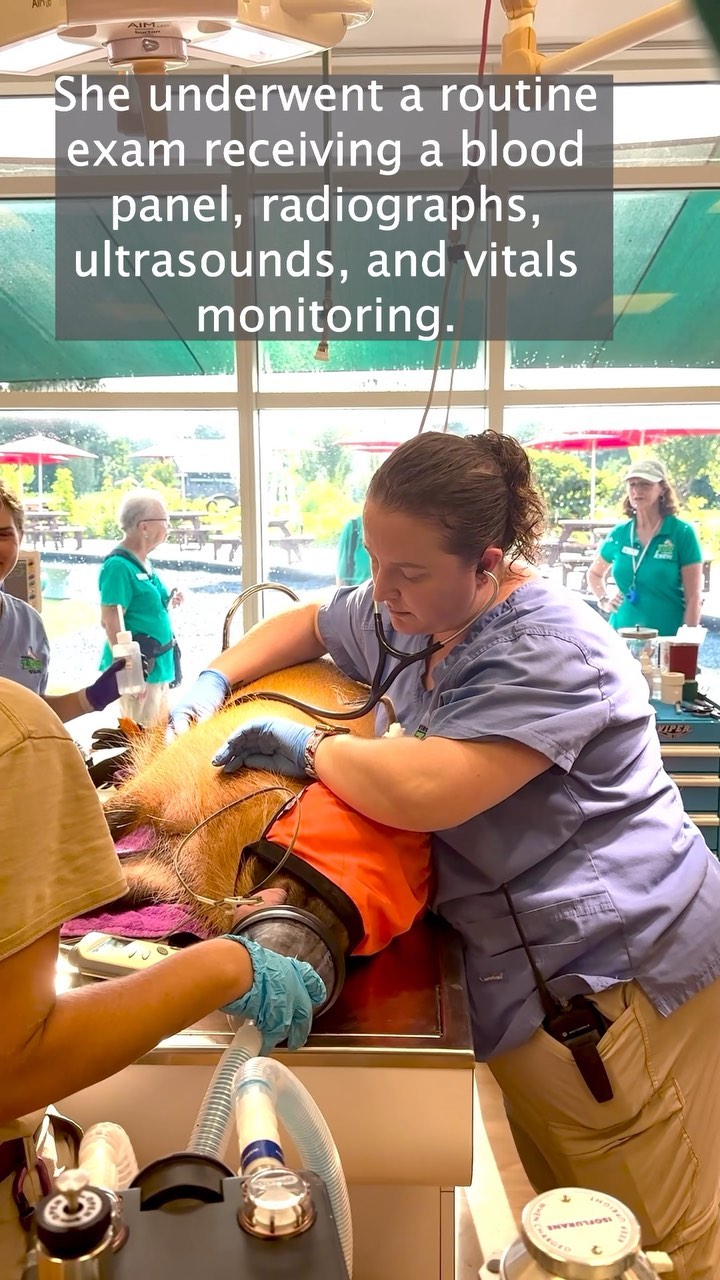Summary:
– The Virginia Zoo participates in a Species Survival Plan (SSP) for red river hogs to ensure the long-term sustainability of the population.
– Tikiti, a female red river hog, received a birth control implant during her regular exam due to health issues and not being recommended for breeding.
– The procedure occurred at the Animal Wellness Campus, and visitors can witness veterinary procedures.
– Mastitis, an infection in the mammary glands, was why Tikiti underwent a partial mastectomy.
This little piggy went to the vet! Follow along as one of our female red river hogs, Tikiti receives a birth control implant during her regular exam at the Virginia Zoo’s Animal Wellness Campus. In this blog post, we delve into the unique and fascinating aspects of the procedure and the reasons behind it.
The Virginia Zoo participates in the Species Survival Plan (SSP) program, which is overseen by the Association of Zoos and Aquariums (AZA). The SSP aims to maximize zoo populations’ genetic diversity and long-term sustainability by carefully pairing individuals and monitoring breeding. This helps prevent inbreeding and preserves the health and vitality of the species.
Tikiti, after giving birth to a red river hog named Lou in 2022, developed recurring mastitis. Mastitis is a common infection in nursing mammals, including humans. To prevent future complications, Tikiti underwent a partial mastectomy, which involved the removal of a portion of her mammary gland tissue. While this procedure successfully resolved the mastitis issue, it also meant that Tikiti was no longer recommended for breeding.
Ensuring Tikiti’s future welfare became a priority, and birth control was deemed necessary to prevent accidental breeding. Birth control in animals is somewhat similar to that in humans, although the methods may differ. In Tikiti’s case, a birth control implant was the most appropriate solution. This implant, once inserted, releases hormones that prevent Tikiti from becoming pregnant.
The procedure occurred at the Virginia Zoo’s Animal Wellness Campus, where the veterinary team carefully prepared for Tikiti’s visit. The Animal Wellness Campus is an essential part of the ZZoo’s commitment to providing the highest standard of care for its animal residents. It is also an opportunity for visitors to witness veterinary procedures and gain a deeper understanding of the importance of animal healthcare.
Observing a veterinary procedure can be an enlightening and educational experience. It allows visitors to see the level of care and expertise that goes into ensuring the well-being of the animals. The Virginia Zoo encourages visitors to come early in the morning to witness such procedures firsthand.
The birth control implant procedure itself is a relatively simple and quick process. The veterinary team sedates Tikiti to ensure her comfort throughout the procedure. Once under anesthesia, a small incision is made near her flank, and the birth control implant is inserted into the subcutaneous tissue. The incision is closed with sutures or surgical glue, and Tikiti can recover.
The birth control implant works by releasing hormones that prevent ovulation and conception. This birth control method has proven effective and safe for various animal species, including red river hogs. It offers a non-permanent solution, as the implant can be removed if circumstances change, such as a recommendation for breeding in the future.
The Virginia Zoo’s commitment to the well-being and care of its animals extends beyond basic needs. Participation in programs such as the Species Survival Plan contributes to the long-term sustainability and genetic health of the species they house. By making informed decisions about breeding and implementing birth control when necessary, they ensure the welfare of individual animals like Tikiti while safeguarding the species’ future.
In conclusion, Tikiti’s journey to the vet for a birth control implant highlights the unique and fascinating aspects of caring for animals in a zoo setting. The Virginia Zoo’s involvement in the Species Survival Plan and its dedication to providing the highest standard of veterinary care ensure the well-being and sustainability of the Red River hog population. Witnessing a veterinary procedure like Tikiti’s implant insertion offers visitors an opportunity to gain insights into the complexities of animal healthcare and the lengths zoos go to protect and preserve species. So, next time you visit the ZZoo, watch for the unexpected and remarkable stories that unfold behind the scenes.
*****
Source Description
This little piggy went to the vet! 🩺 Follow along as one of our female red river hogs, Tikiti, receives a birth control implant during her regular exam.
The Virginia Zoo participates in a Species Survival Plan (SSP) for red river hogs. This program is run by @zoos_aquariums (AZA) and oversees and manages species’ populations in zoos by pairing individuals and monitoring breeding to maximize genetic diversity and the long-term sustainability of populations. When an animal is not recommended for breeding, birth control may be necessary.
After giving birth to our red river hog Lou in 2022, Tikiti developed recurring mastitis — an infection in the mammary glands common in nursing mammals (including humans!). After undergoing a partial mastectomy to prevent future complications, Tikiti is not recommended to breed again, making birth control necessary to ensure her future welfare.
Visit the Zoo early in the morning to see a veterinary procedure at our Animal Wellness Campus!
Check out our latest blog to learn more about this procedure. Link in bio!


